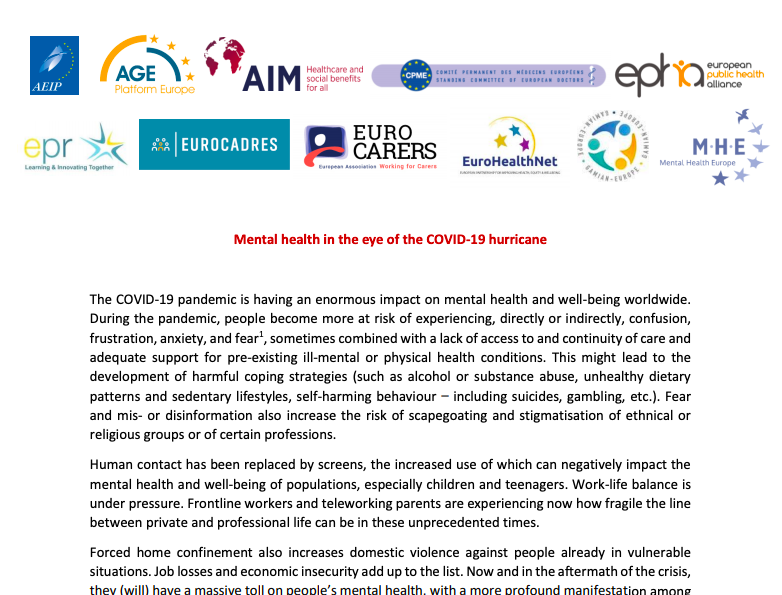The COVID-19 pandemic is having an enormous impact on mental health and well-being worldwide. During the pandemic, people become more at risk of experiencing, directly or indirectly, confusion, frustration, anxiety, and fear , sometimes combined with a lack of access to and continuity of care and adequate support for pre-existing ill-mental or physical health conditions. This might lead to the development of harmful coping strategies (such as alcohol or substance abuse, unhealthy dietary patterns and sedentary lifestyles, self-harming behaviour – including suicides, gambling, etc.). Fear and mis- or disinformation also increase the risk of scapegoating and stigmatisation of ethnical or religious groups or of certain professions.
The COVID-19 pandemic is having an enormous impact on mental health and well-being worldwide. During the pandemic, people become more at risk of experiencing, directly or indirectly, confusion, frustration, anxiety, and fear , sometimes combined with a lack of access to and continuity of care and adequate support for pre-existing ill-mental or physical health conditions. This might lead to the development of harmful coping strategies (such as alcohol or substance abuse, unhealthy dietary patterns and sedentary lifestyles, self-harming behaviour – including suicides, gambling, etc.). Fear and mis- or disinformation also increase the risk of scapegoating and stigmatisation of ethnical or religious groups or of certain professions.
Human contact has been replaced by screens, the increased use of which can negatively impact the mental health and well-being of populations, especially children and teenagers. Work-life balance is under pressure. Frontline workers and teleworking parents are experiencing now how fragile the line between private and professional life can be in these unprecedented times.
Forced home confinement also increases domestic violence against people already in vulnerable situations. Job losses and economic insecurity add up to the list. Now and in the aftermath of the crisis, they (will) have a massive toll on people’s mental health, with a more profound manifestation among lower socio-economic groups. It has indeed become clear that not everyone experiences those impacts equally, and that some in our societies and communities are left behind more than others.
In face of the current turmoil which our populations are facing, AIM has gathered with 10 other healthcare NGOs in order to issue a set of recommendations to decision-makers.





